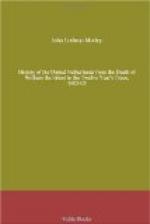The stadholder was feasted and honoured by the mutineers during his brief visit to Hoogatraaten, and concluded with them a convention, according to which that town was to be restored to him, while they were to take temporary possession of the city of Grave. They were likewise to assist, with all their strength, in his military operations until they should make peace on their own terms with the archduke. For two weeks after such treaty they were not to fight against the States, and meantime, though fighting on the republican side, they were to act as an independent corps and in no wise to be merged in the stadholder’s forces. So much and no more had resulted from the archduke’s excommunication of the best part of his army. He had made a present of those troops to the enemy. He had also been employing a considerable portion of his remaining forces in campaigning against their own comrades. While at Grave, the mutineers, or the “squadron” as they were now called, were to be permitted to practise their own religious rites, without offering however, any interference with the regular Protestant worship of the place. When they should give up Grave, Hoogstraaten was to be restored to them if still in possession of the States and they were to enter into no negotiations with the archduke except with full knowledge of the stadholder.
There were no further military, operations of moment during the rest of the year.
Much, more important, however, than siege, battle, or mutiny, to human civilization, were the steady movements of the Dutch skippers and merchants at this period. The ears of Europe were stunned with the clatter of destruction going on all over Christendom, and seeming the only reasonable occupation of Christians; but the little republic; while fighting so heroically against the concentrated powers of despotism in the West, was most industriously building up a great empire in the East. In the new era just dawning, production was to become almost as honourable and potent, a principle as destruction.
The voyages among the spicy regions of the equator—so recently wrested from their Catholic and Faithful Majesties by Dutch citizens who did not believe in Borgia—and the little treaties made with petty princes and commonwealths, who for the first time ware learning that there were other white men in the world beside the Portuguese, had already led to considerable results. Before the close of, the previous year that great commercial corporation had been founded—an empire within an empire; a republic beneath a republic—a counting-house company which was to organize armies, conquer kingdoms, build forts and cities, make war and peace, disseminate and exchange among the nations of the earth the various products of civilization, more perfectly than any agency hitherto known, and bring the farthest disjoined branches of the human family into closer, connection than had ever existed before. That it was a monopoly, offensive to true commercial principles, illiberal, unjust, tyrannical; ignorant of the very rudiments of mercantile philosophy; is plain enough. For the sages of the world were but as clowns, at that period, in economic science.




